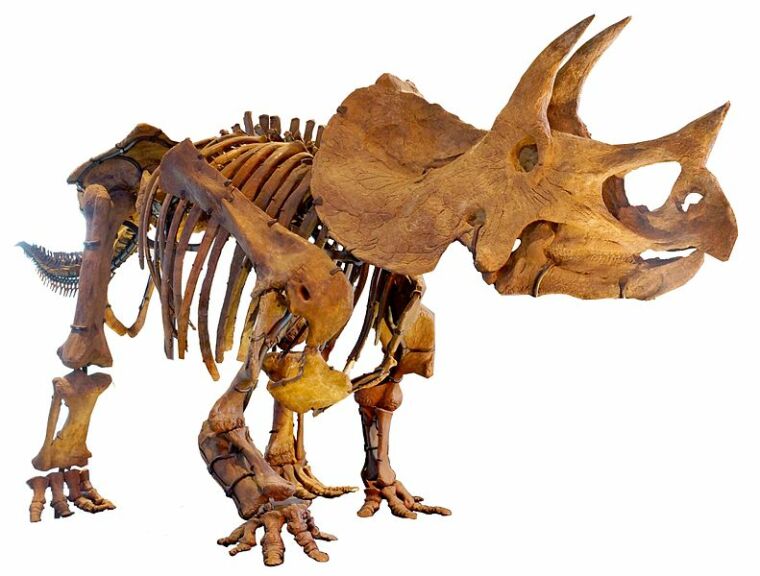Dinosaurs' extinction not all about massive asteroid hit, study claims
The theory on the dinosaur-killing asteroid hit, which many believe to have wiped out the prehistoric beasts 66 million years ago, no longer suffices as an explanation, as scientists came up with a study revealing that their extinction started earlier.
Researchers concluded that the number of dinosaurs was already decreasing even before the devastation that happened in the present-day Gulf of Mexico, based on their statistical analysis. The group was comprised of experts from England's University of Reading and the University of Bristol.
The issue on whether dinosaurs had been reigning strongly or had already been numerically challenged prior to their total disappearance has long been a subject of debate. Coming up with a resolution has been challenging due to lack of precision in the methods used.

"Paleontologists have discussed and argued in length over decades about whether dinosaurs were experiencing a long-term decline even before their final extinction," Manabu Sakamoto, the study lead author, from the University of Reading told The Christian Science Monitor.
According to the Proceedings of National Academy Sciences journal that published the results, species were disappearing faster than their emergence. This pattern is said to have started millions of years before their final extinction, as supported by a statistical procedure used specially for this study.
Statistical analysis was based on "family trees," from which three large ones were identified: the flesh-eating beasts or the theropods, the long-necked herbivores or the sauropods, and the long-beaked, plant-eating species or the ornithiscians.
Results further show that dinosaurs were rising in number during late Triassic period, or around 220 million years ago. This growth reached a plateau, however, paving the way for a significant, long-term decline 90 million years ago, more than two decades before the space rock hit the planet.
"If they continued on that trajectory, even if that meteor didn't hit, they may well have been very species-poor in some millions of years or even have gone extinct all together," researcher Chris Vendetti of the University of Reading said, according to The Guardian.
 Christians don't have to affirm transgenderism, but they can’t express that view at work: tribunal
Christians don't have to affirm transgenderism, but they can’t express that view at work: tribunal Archaeology discovery: Medieval Christian prayer beads found on Holy Island
Archaeology discovery: Medieval Christian prayer beads found on Holy Island Presbyterian Church in America votes to leave National Association of Evangelicals
Presbyterian Church in America votes to leave National Association of Evangelicals Over 50 killed in 'vile and satanic' attack at Nigerian church on Pentecost Sunday
Over 50 killed in 'vile and satanic' attack at Nigerian church on Pentecost Sunday Ukrainian Orthodox Church severs ties with Moscow over Patriarch Kirill's support for Putin's war
Ukrainian Orthodox Church severs ties with Moscow over Patriarch Kirill's support for Putin's war Islamic State kills 20 Nigerian Christians as revenge for US airstrike
Islamic State kills 20 Nigerian Christians as revenge for US airstrike Man who served 33 years in prison for murder leads inmates to Christ
Man who served 33 years in prison for murder leads inmates to Christ


 Nigerian student beaten to death, body burned over ‘blasphemous’ WhatsApp message
Nigerian student beaten to death, body burned over ‘blasphemous’ WhatsApp message 'A new low': World reacts after Hong Kong arrests 90-year-old Cardinal Joseph Zen
'A new low': World reacts after Hong Kong arrests 90-year-old Cardinal Joseph Zen Iran sentences Christian man to 10 years in prison for hosting house church worship gathering
Iran sentences Christian man to 10 years in prison for hosting house church worship gathering French Guyana: Pastor shot dead, church set on fire after meeting delegation of Evangelicals
French Guyana: Pastor shot dead, church set on fire after meeting delegation of Evangelicals ‘Talking Jesus’ report finds only 6% of UK adults identify as practicing Christians
‘Talking Jesus’ report finds only 6% of UK adults identify as practicing Christians Mission Eurasia ministry center blown up in Ukraine, hundreds of Bibles destroyed: 'God will provide'
Mission Eurasia ministry center blown up in Ukraine, hundreds of Bibles destroyed: 'God will provide' Church holds service for first time after ISIS desecrated it 8 years ago
Church holds service for first time after ISIS desecrated it 8 years ago Burger King apologizes for 'offensive campaign' using Jesus' words at the Last Supper
Burger King apologizes for 'offensive campaign' using Jesus' words at the Last Supper Uganda: Muslims abduct teacher, burn him inside mosque for praying in Christ’s name
Uganda: Muslims abduct teacher, burn him inside mosque for praying in Christ’s name